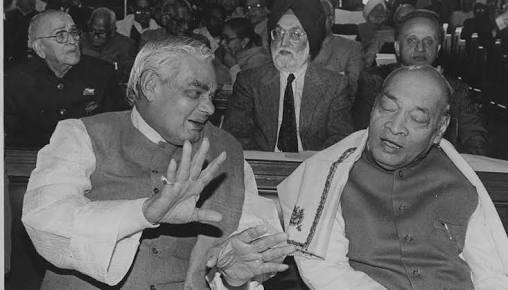The passing of Shri Atal Behari Vajpayee leaves the country bereft of yet another statesman-politician. One of the foremost figures of the BJP, Vajpayee ji’s term as Prime Minister accelerated the economic reforms initiated by the former Prime Minister Shri P. V. Narasimha Rao. This, however, is not an analysis of Shri Vajpayee’s political career, but an account of his friendship with my father, Shri P. V. N. The two stalwarts from opposing parties shared a warm camaraderie based on a mutual respect for each other’s knowledge: as evinced by their names for each other – Shri P.V.N. referred to Vajpayee ji as ‘Guruji’ (Master) and Vajpayee ji called P.V.N ‘Gurughantal’ (Master of Masters)!
This unlikely friendship began when P.V.N became MP for first time in 1977 (from Hanamkonda) and lasted almost two and a half decades. The base for the friendship was laid when P.V.N succeeded Vajpayee as Foreign Minister. In a departure from the norm, P.V.N retained the entire staff of Vajpayee, who was the outgoing Foreign Minister, without inhibition, so strong was his faith in the man.
While interaction between them was initially related to matters concerning the Foreign Ministry, it was transformed into an enduring friendship when both men realised their common interests, especially in Hindi literature. As a mark of their strong friendship, P.V.N released Vajpayee ji’s collection of poems ‘Meri Ekyavan Kavitayein’ in 1995 and Shri Vajpayee released P.V.N’s book ‘Insider’ in 1998.
Although both politicians belonged to different schools of thought, the ideological difference never came in way of their relationship, especially as both men were unequivocal in their love for India. They spent hours discussing issues of national interest putting aside party affiliations.
Their trust on each other was so immense that Shri P.V.N, as the Prime Minister of India, sent Vajpayee ji as the Leader of the Indian delegation to the 1994 session of the Human Rights Commission at Geneva. Shri Vajpayee was entrusted with defending India’s views on Kashmir, and countering Pakistan’s claims of human rights violations by India in Kashmir. This decision was widely criticised by both parties – by the Congress for mooting such a proposal, and by the BJP for accepting it – but the outcome was a resounding success, vindicating the stand taken by both men. After P.V.N’s demise in 2004, an emotional Vajpayee ji recollected that P.V.N, as the outgoing PM, had entrusted him with a chit bearing the inscription ‘saamagri tayyar hai, tum aage badh sakte ho’ (The material is ready. You can go ahead.), crediting him as the true father of India’s nuclear programme.
Both men were scholars and statesmen, and shared a liberal outlook. For both of them, India was paramount. Their relationship was remarkable. The relationship that began when Shri P.V.N inherited Shri Vajpayee’s post as Foreign Minister, continued long after Vajpayee ji inherited Shri P.V.N’s post as Prime Minister of the country. These leaders demonstrated the true meaning of opposition in a democracy – always alert, constructive criticism delivered with wit, but never crass or detrimental to the nation.
After my father’s demise, I visited Shri Vajpayee a couple of times. A perfect gentleman, he spoke with great fondness of my father, recollecting their friendship and reminiscing their experiences. Shri Vajpayee was a fatherly-figure – gentle, affable, knowledgeable and, above all, affectionate. An excellent host, he remembered all my father’s favourite foods, instructing his staff to serve them to me as well. It is with a heavy heart that I bid farewell to the gentleman who was a great statesman, a true patriot and my father’s friend.
About the author: P. V. Prabhakar Rao is the President of the Swami Ramananda Tirtha Institute of Socio-Economic Research and National Integration. He is the third son of statesman politician Sri P.V. Narasimha Rao. Mr. Prabhakar Rao is conversant with post 1980s politics in India. In addition to his four-decade long career as an industrialist and entrepreneur, Mr Rao assisted his father by coordinating his activities with other senior political dignitaries and bureaucrats, handling his media interactions, and collating data from the grassroots.








 OpinionExpress.In
OpinionExpress.In















Comments (0)